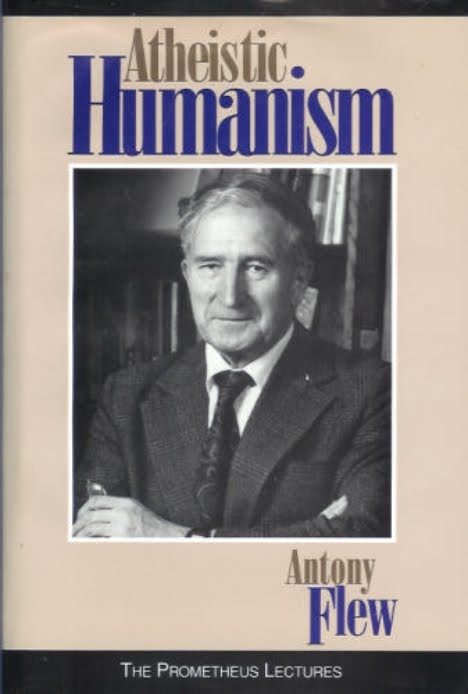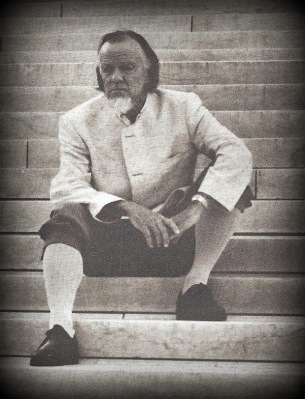_____________
Antony Flew on God and Atheism
Published on Feb 11, 2013
Lee Strobel interviews philosopher and scholar Antony Flew on his conversion from atheism to deism. Much of it has to do with intelligent design. Flew was considered one of the most influential and important thinker for atheism during his time before his death (he’s a much better thinker than Richard Dawkins too – even when he was an atheist). His conversion to God-belief has caused an uproar among atheists. They have done all they can to lessen the impact of his famous conversion by shamelessly suggesting he’s too old, senile and mentally deranged to understand logic and science anymore.
News on Antony Flew’s conversion:
http://www.youtube.com/watch?v=X1e4FU…
Interview and discussion with Antony Flew:
https://www.youtube.com/watch?v=53REH…
________________
Did Jesus Rise from the Dead Gary Habermas vs Anthony Flew
Published on May 30, 2013
Gary Habermas vs Anthony Flew – Did Jesus rise from the dead?
____________
Antony Flew – World’s Most Famous Atheist Accepts Existence of God
Uploaded on Nov 28, 2008
Has Science Discovered God?
A half-century ago, in 1955, Professor Antony Flew set the agenda for modern atheism with his Theology and Falsification, a paper presented in a debate with C.S. Lewis. This work became the most widely reprinted philosophical publication of the last 50 years. Over the decades, he published more than 30 books attacking belief in God and debated a wide range of religious believers.
Then, in a 2004 Summit at New York University, Professor Flew announced that the discoveries of modern science have led him to the conclusion that the universe is indeed the creation of infinite Intelligence.
For More Info Visit:
http://ScienceFindsGod.com
__________________
Discussion (2 of 3): Antony Flew, N.T. Wright, and Gary Habermas
____________
The Kalam Cosmological Argument (Scientific Evidence) (Henry Schaefer, PhD)
Published on Jun 11, 2012
Scientist Dr. Henry “Fritz” Schaefer gives a lecture on the cosmological argument and shows how contemporary science backs it up.
___________________________________________
Uploaded on Jul 2, 2009
Ricky Gervais – Losing Religion and Becoming An Atheist
_____________________
Debate – Does God Exist? William Lane Craig vs Herb Silverman
Uploaded on Aug 21, 2011
University of North Carolina Wilmington (March 23, 2010) – Does God Exist? William Lane Craig debates atheist Herb Silverman on the existence of God.
Links:
http://reasonablefaith.org
http://drcraigvideos.blogspot.com
We welcome your comments in the Reasonable Faith forums:
http://www.reasonablefaith.org/forums/
Follow Reasonable Faith On Twitter: http://twitter.com/rfupdates
Add Reasonable Faith On Facebook:http://www.facebook.com/reasonablefai…
The Bible and Science (Part 02)
___________________

From the Antony Flew’s last book.
Roy Abraham Varghese wrote in Preface:
Review: There Is A God
 There Is a God: How the World’s Most Notorious Atheist Changed His Mind. By Antony Flew. HarperOne: New York, 2007. 222pp.
There Is a God: How the World’s Most Notorious Atheist Changed His Mind. By Antony Flew. HarperOne: New York, 2007. 222pp.Reviewed by R.C. Sproul.A Tale of Two ParablesWith the publication of his book, There Is a God: How the World’s Most Notorious Atheist Changed His Mind, the British philosopher Antony Flew dropped a bomb on the playground of Western atheists. In this book, Antony Flew traces his lifelong pilgrimage from hardcore atheism to what he calls rational theism. His change of mind in his latter years has been greeted by jeers, hoots, and hollers from the atheistic community, claiming that the once brilliant philosopher has suddenly grown senile in order to acquiesce to claims of the reality of God. Anyone, of course, who reads this book from Antony Flew will quickly recognize that the claim of incipient senility is mere sour grapes by his present opponents who were his former comrades. Rather, his book exhibits a mind that remains brilliantly lucid and acute in its analytical thought.I’ve titled this review, “A Tale of Two Parables.” The reason is that in the first instance, apart from the parables of Jesus found in the New Testament, I doubt if there is any parable more famous in the annals of philosophy than the famous parable devised by Anthony Flew in the middle of the twentieth century, which is referred to simply as, “Flew’s Parable.” The parable tells the story of two explorers who are hacking their way through a dense jungle when suddenly they came upon a clearing marked by a magnificent garden. The garden displays rows of perfect symmetry and a cultivation that indicates the presence of no weeds. The first explorer exclaimed his conviction that this garden obviously indicates a presence of a gardener. The two men set about their quest to discover the gardener. When no gardener appeared to tend the garden, one of the explorers argued that the appearance of this orderly garden was simply a freak of nature, and there was actually no gardener present. The other persisted in his assumption that there must be a gardener, and claimed that the gardener perhaps was invisible. So they set a trap by stringing wires around the garden, and attaching bells to them, so that if the invisible gardener appeared to tend his plot, he would make his presence known by making the bells ring. When the bells did not ring, the explorer who argued for the presence of the gardener insisted that the gardener must not only be invisible but immaterial. In the debate that ensued, the first explorer finally in exasperation said, “What is the difference between an invisible and immaterial gardener and no gardener at all?”
Flew’s point in this original parable was that God had died the death of a thousand qualifications. We must remember that this original parable appeared in the midst of the strength of linguistic analysis as a dominant school of philosophical thought in the middle of the 20th century. In that context, analyses were made of religious and theological language, and the conclusion was drawn by many that theological language about God has no empirical verifiable referent to justify the language. So the strongest skeptics reduced all religious language simply to what they called emotive language, which language spoke more of the believers in God than it did of the nature of God Himself. This all provoked what was called in the middle of the century, the “God Talk controversy” or the “God Talk crisis,” which in the theological realm culminated in the death of God movement. The lingering problem with the old parable that Flew presented was the garden. Though no gardener could be found, the presence of the garden itself remained a nagging issue begging for explanation.At the prime of his atheism, Flew argued that the burden of proof for the existence of God fell upon those who would assert it in a positive form, rather than upon those who would deny it. At that point, he argued that the default position, absence of any compelling evidence, would be atheism. At this point, Flew was merely applying basic principles of logic and proof by indicating that verification is always easier than falsification. If we recall the analysts of that day, the standard illustration of this was the statement: “There is gold in Alaska.” To verify the assumption that gold exists in Alaska, all one must do is to find a piece of it somewhere in that state. One bit of gold discovered in Alaska would empirically verify the assertion: “There is gold in Alaska.”On the contrary, if someone asserted that there is no gold in Alaska, to falsify that claim, one would have to dig up every square inch of the state without finding any gold. And even then if no gold were found, someone might posit the explanation that people were clumsy in their explorations and overlooked the presence of what was really there. This is the type of argument that people make when they say that there are little green men who live on the other side of the moon, who can never be discovered by telescopes or scientific inquiry because these green men have a built in allergy and antipathy to all things scientific. Such a truth claim of little green men of this nature can never be falsified. People will take comfort in the fact, saying, “Well, my theory has never been disproved.” But Flew rightly points out that questions like this and the existence of God put the burden of proof on those who argue for it, rather than on those who argue against it.Flew began his commitment to atheism at the young age of 15, when he was convinced, as was England’s other famous twentieth century atheist Bertrand Russell, by John Stuart Mill’s arguments against theism based on the problem of the existence of evil. Both men became atheists in their teens and both by being convinced by the arguments of John Stuart Mill. The irony of the atheism of Flew was that his father was a minister of great commitment and conviction of biblical truth. The son rejected the father’s convictions in toto. One principle of philosophy, however, made a lasting impact on Antony Flew. It was the axiom uttered by Plato’s hero Socrates in the Republic, in which Socrates argues that one must follow the arguments wherever they lead. Or as Flew articulated it, he felt a lifelong commitment to follow the evidence, wherever that evidence took him.In this book he argues that the evidence that he has examined over the years has brought him to a radically different conclusion about the existence of God from where he stood decades ago. He has now composed a new parable to explain the change in his thinking. He tells the story of a cell phone that washes ashore on a remote island inhabited by primitive people, who were otherwise out of touch with modern civilizations. The natives there play with the numbers on the phone, and when they hear different voices coming out of the little box, the assumption they make is that the box itself is making all the noises. The tribe has some clever scientists who are able to replicate this box that had washed ashore, and they hear the same voices. They come to the conclusion that the obvious is true, namely that the voices are merely properties of the device.
Then the great sage of the tribe suggests that the voices that are similar to the tribe’s own but coming in a different language were not found simply in the little box, but that they were coming from afar off, from real people, not from parts of this little box, and argued that this consideration should be explored as a real possibility. However, the tribal “scientists” refused to consider it at all. They remained close-minded — as many modern thinkers have been totally close-minded to any possibility to the existence of God and are forced to argue that life on this planet has arisen spontaneously by chance, and that even the so-called laws of nature with which science works are lawless in themselves. The examination of the nature and the properties of things, or the “what” questions have not been able to answer the “why” questions, and particularly the “how” questions of any one thing’s existence or how life has come to pass.
In his pilgrimage, Flew encountered three questions that would not go away and for which he found no satisfying answer from the realm of materialism or naturalism. These three questions are first of all: How did the laws of nature come to be? Second, how did life originate from non-life? And third, how did the universe come into being? He explores the question of who wrote the laws of nature. There are those who argue that the laws of nature are merely convenient forms that human investigators impose on nature, that nature’s facts are brute facts and mute facts, and have no inherent design. Design is something that is merely projected upon nature from the thinking of the scientist. In this case, Flew argues that the atheists accept the laws of nature simply by faith, and pursues the point that these laws are not something that are the result of cultural creation, but rather the discovery of something that exists within nature itself. Newton did not invent the law of gravity or impose a principle of gravity on the natural world; rather, he discovered it as an external reality.
Now, the very presence of laws in nature indicates that nature has intelligible order. The overarching presupposition of all scientific inquiry is that the inquiry can yield intelligible information. If indeed the universe and everything in it is utter chaos, without order, then it would be equally unintelligible. The fact that science can proceed in an intelligible manner screams to Anthony Flew that there must be order in it. It is a short step or an easy argument to move from the presence of order to the presence of design. In a sense, the presence of order is virtually tautological to the question of design.
The second question that captivated the inquiry of Flew was the question: How did life originate from non-life? And he sees no acceptable naturalistic or materialistic explanation for the emergence of life. Life in all of its complexity requires design and intelligence. He argues at the same time that everything that is alive is teleological, that life functions and moves in a purposeful rather than chaotic direction. The third argument is perhaps the one most captivating to him, and that was the question: How did the universe come into existence? The emergence of Big Bang cosmology was the explosion that rattled Flew’s philosophical world. It argues that if there was such a thing as a big bang 16 to 18 billion years ago from which the universe emerged, this would clearly indicate that the universe had a beginning.
The absolute, non-negotiable principle, with which Flew rightly works, is the principle that nothing has the ability to produce itself, that the whole notion of self-creation is a manifest absurdity. For something to create itself, it would have to be before it was. And so he espouses the age old axiom, ex nihilo nihil fit, out of nothing, nothing comes. He even quotes from the musical, The Sound of Music, in which the song is sung, “Nothing comes from nothing, and nothing ever could….” Because of the Big Bang cosmology, once again the cosmological argument is reconsidered.
Flew also takes time to critique Hume’s skepticism with respect to causal principles. He argues that every effect must have a cause and a sufficient reason for its being. The universe has neither a cause for itself nor such a sufficient reason built in. Though effects require causes, self-existent eternal beings do not. The fact that something exists now and that the universe as we know it has a beginning, rules out the possibility of finding a sufficient cause in contingent effects. The only reasonable explanation for the origin of the existence of the universe is found in the power of a self-existent, eternal being.
Attempts to argue for multiple universes or fluctuations within vacuums only exacerbate the problem. The argument from the infinite series of finite causes simply compounds the problem of self-creation infinitely. Fluctuations within vacuums are at best question begging and at worst fanciful flights of imagination. As a result of his reexamination of the evidence, Antony Flew has come to the conclusion that the universe was created by a self-existent, immutable, immaterial, omnipotent, and omniscient being. He states that he is not yet come full circle to affirming doctrines found in biblical revelation. He has thus far restricted his findings to natural theology. He indicates that he is open to more consideration of biblical revelation. For this reason, he includes in his book an appendix written by Bishop N.T. Wright, in which Wright argues for the historical reality of the incarnation and of the resurrection of Christ. Before the added appendices, Flew ends the body of the work itself with this statement: “Someday I may hear a Voice, that says, ‘Can you hear me now?'”
Dr. R.C. Sproul is an Alliance Council Member and the president of Ligonier Ministries. Dr. Sproul is featured daily on the Renewing Your Mind radio broadcasts and the author of many books including his most recent work, “The Truth of the Cross”.
____________
Related posts:
ANTONY FLEW’S SIGNIFICANCE IN THE HISTORY OF ATHEISM by Roy Abraham Varghese
________________ ________ Antony Flew – World’s Most Famous Atheist Accepts Existence of God Uploaded on Nov 28, 2008 Has Science Discovered God? A half-century ago, in 1955, Professor Antony Flew set the agenda for modern atheism with his Theology and Falsification, a paper presented in a debate with C.S. Lewis. This work became the most […]
Antony Flew did not make a public profession of faith in Christ but will his conversion from atheism to theism have an impact?
____________ Jesus’ Resurrection: Atheist, Antony Flew, and Theist, Gary Habermas, Dialogue Published on Apr 7, 2012 http://www.veritas.org/talks – Did Jesus die, was he buried, and what happened afterward? Join legendary atheist Antony Flew and Christian historian and apologist Gary Habermas in a discussion about the facts surrounding the death and resurrection of Jesus Christ. Join the […]
Concerning the book THERE IS A GOD Antony Flew stated, “This is my book and it represents my thinking!
_______ ________ Does God Exist?: William Lane Craig vs Antony Flew Uploaded on Dec 16, 2010 http://drcraigvideos.blogspot.com – William Lane Craig and Antony Flew met in 1998 on the 50th anniversary of the famous Copleston/Russell debate to discuss the question of God’s existence in a public debate. Unlike Richard Dawkins, Flew was one of the most […]
Bill Muehlenberg’s review of “There Is a God” By Antony Flew
_________________ Antony Flew on God and Atheism Published on Feb 11, 2013 Lee Strobel interviews philosopher and scholar Antony Flew on his conversion from atheism to deism. Much of it has to do with intelligent design. Flew was considered one of the most influential and important thinker for atheism during his time before his […]
Former Atheist Antony Flew noted that Evolutionists failed to show “Where did a living, self-reproducing organism come from in the first place?”
____ Does God Exist? Thomas Warren vs. Antony Flew Published on Jan 2, 2014 Date: September 20-23, 1976 Location: North Texas State University Christian debater: Thomas B. Warren Atheist debater: Antony G.N. Flew For Thomas Warren: http://www.warrenapologeticscenter.org/ ______________________ Antony Flew and his conversion to theism Uploaded on Aug 12, 2011 Antony Flew, a well known […]
Educated Scholars like Antony Flew can believe in God!!!
__________ Discussion (1 of 3): Antony Flew, N.T. Wright, and Gary Habermas Uploaded on Sep 22, 2010 A discussion with Antony Flew, N.T. Wright, and Gary Habermas. This was held at Westminster Chapel March, 2008 Debate – William Lane Craig vs Christopher Hitchens – Does God Exist? Uploaded on Jan 27, 2011 April 4, 2009 – Craig […]
Antony Flew rightly noted that Richard Dawkins’ “monkey theorem was a load of rubbish”
________ William Lane Craig versus Eddie Tabash Debate Uploaded on Feb 6, 2012 Secular Humanism versus Christianity, Lawyer versus Theologian. Evangelical Christian apologist William Lane Craig debates humanist atheist lawyer Eddie Tabash at Pepperdine University, February 8, 1999. Visit http://www.Infidels.org andhttp://www.WilliamLaneCraig.com ________________ Antony Flew on God and Atheism Published on Feb 11, 2013 Lee […]
Article from 2005 indicated Antony Flew abandoned atheism because of Law of Biogenesis!!!!
___________ Does God Exist? Thomas Warren vs. Antony Flew Published on Jan 2, 2014 Date: September 20-23, 1976 Location: North Texas State University Christian debater: Thomas B. Warren Atheist debater: Antony G.N. Flew For Thomas Warren: http://www.warrenapologeticscenter.org/ ______________________ Antony Flew and his conversion to theism Uploaded on Aug 12, 2011 Antony Flew, a well known […]
The Christian influence on society is real and that is one of the reasons Antony Flew left Atheism!!!
_____________ Antony Flew on God and Atheism Published on Feb 11, 2013 Lee Strobel interviews philosopher and scholar Antony Flew on his conversion from atheism to deism. Much of it has to do with intelligent design. Flew was considered one of the most influential and important thinker for atheism during his time before his death […]
Antony Flew, George Wald and David Noebel on the Origin of Life
___________ Does God Exist?: William Lane Craig vs Antony Flew Uploaded on Dec 16, 2010 http://drcraigvideos.blogspot.com – William Lane Craig and Antony Flew met in 1998 on the 50th anniversary of the famous Copleston/Russell debate to discuss the question of God’s existence in a public debate. Unlike Richard Dawkins, Flew was one of the most respected […]




























